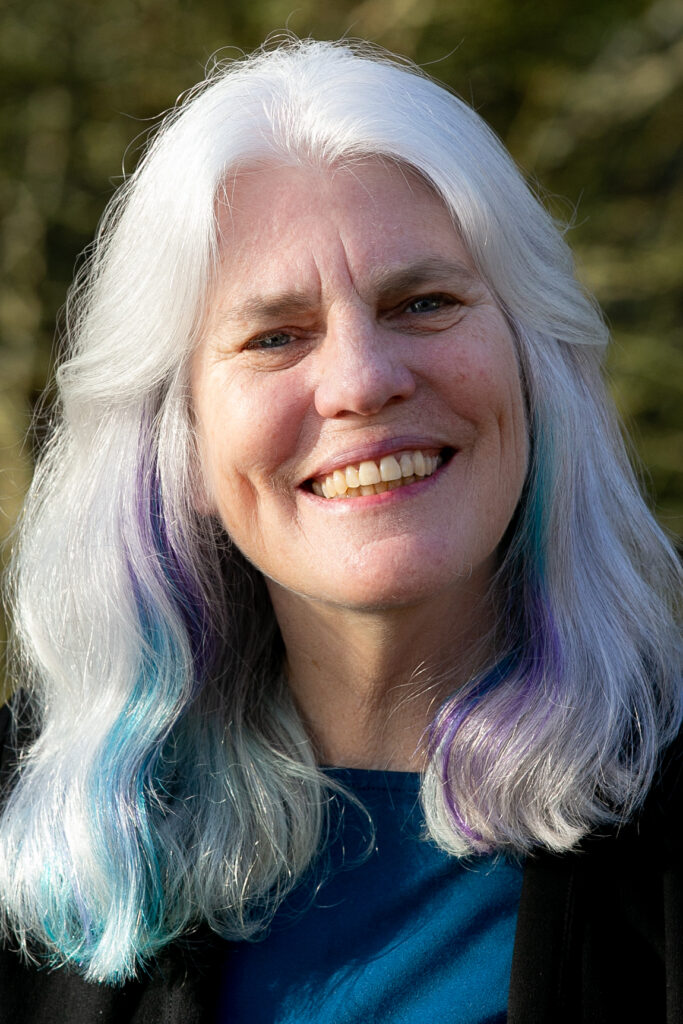
Dr. Inge Molenaar is the director of the National Education Lab AI (NOLAI) and associated professor Educational Sciences at the Behavioural Science Institute at Radboud University in the Netherlands. She has over 20 years of experience in the field of technology enhanced learning taking multiple roles from entrepreneur to academic.
Her research in the Adaptive Learning Lab focusses on technology empowered innovation to optimize students’ learning. The application of data from online learning environments, apps and games in understanding how learning unfolds over time is central in her work. NOLAI focuses on the role of Artificial Intelligence in education which offers a powerful way to make new steps towards measuring, understanding and designing innovative learning scenarios. Dr Molenaar envisions Hybrid Human-Systems that augment human intelligence with artificial intelligence to empower learners and teachers in their quest to make education more efficient, effective and responsive. In NOLAI co-creation between governments, schools, research and industry is used to develop the next generation educational systems. Additionally, dr Molenaar has received an ERC Starting Grant to develop the first Hybrid Human-AI Regulation system to train young learners’ Self-regulated learning skills with the help of AI and she is a Jacobs Foundation Fellow and leads the International research Centre of learning and Living with AI (CELLA) together with Sanna Jarvela.
Dr Molenaar holds Master’s degrees in Cognitive Psychology and International Business studies and a PhD in Educational Sciences (University of Amsterdam).

Dr. Candace Thille is the director for workforce and adult learning in the Stanford Accelerator for Learning and a professor of Education and Neuroscience at Stanford University. Prior to rejoining Stanford in 2023, she spent five years as the director of learning science at Amazon.
She was the founding director of the Open Learning Initiative at Carnegie Mellon University. For the past two decades, in all her roles, her focus has been on applying the results from research in the science of human learning to the design of technology mediated learning environments and in using those environments to conduct research at the intersection of human learning and machine learning. Thille serves on the board of ETS and has served on the board of the AACU; on the Assessment 2020 Task Force of the American Board of Internal Medicine; and on the advisory council for NSF EHR. She served the U.S. Department of Education, co-authoring the 2010 and 2015 National Education Technology Plans.
Dr. Thille holds a bachelor’s degree from the University of California, Berkeley, a master’s degree from Carnegie Mellon University, and a doctorate from the University of Pennsylvania.

Professor Shane Dawson | Executive Dean UniSA: Education Futures
Shane Dawson is the Executive Dean Education Futures, Co-Director of the Centre for Change and Complexity in Learning (C3L) and Professor of Learning Analytics at the University of South Australia. As a founding executive member of the Society for Learning Analytics Research, past keynote presenter, program and conference chair of the International Learning Analytics and Knowledge conference and an inaugural co-editor of the Journal for Learning Analytics. His current research interests relate to complex systems and academic leadership to aid adoption and application of learning analytics at scale.
Below is the Schedule for our face to face conference on 5, 6 & 7 (MDT) of December 2023 at Arizona State University.
|
Tuesday December 5, 2023 |
Wednesday December 6, 2023 |
Thursday December 7, 2023 |
|
|
8.00am |
Registration Bldg 1, Level 3, Ingenuity |
Registration Bldg 3, Level 1 Synergy |
Registration Bldg 3, Level 1 Synergy |
|
8.30am |
|||
|
9.00am |
Invitation only Scientific Committee and Advisory BoardBldg 1, Level 3, Room 301 Ingenuity |
Keynote – Shane Dawson |
Keynote – Inge Molenaar |
|
9.30am |
|||
|
10.00am |
Coffee Break |
Coffee Break |
|
|
10.30am |
Empowering Education: Unleashing the Potential of Generative AI in Teaching and Learning |
Integrating Artificial Intelligence in Higher Education to Advance Efficacy and Equity: Insights from Southern New Hampshire University |
|
|
11.00am |
|||
|
11.30am |
Learning Design and AI |
Exploring Generative AI in Education Through a Student Lens |
|
|
12.00pm |
Lunch Registration Bldg 3, Level 1 Synergy |
||
|
12.30pm |
Lunch Registration Bldg 3, Level 1 Synergy |
Lunch Registration Bldg 3, Level 1 Synergy |
|
|
1.00pm |
Welcome and Opening |
||
|
1.30pm |
Mindless mirrors: The inevitability of anthropomorphizing generative AI |
Postsecondary Leadership Perspectives on AI |
Pioneering Ethical Governance and Pedagogy in the Era of AI in Higher Education |
|
2.00pm |
|||
|
2.30pm |
Coffee Break |
Coffee Break |
Coffee Break |
|
3.00pm |
AI 101 and Learning Sciences |
Empowering Learners to use GenAI and Governance Issues at the Largest College in the U.S. |
Charting AI in Education: Reflecting on Today, Envisioning Tomorrow |
|
3.30pm |
|||
|
4.00pm |
AI in Higher Education: Reinvigorating Institutions and Improving Student Success |
Keynote – Candace Thille |
Departure |
|
4.30pm |
|||
|
5.00pm |
Networking Reception |
Networking Reception |
|
|
5.30pm |
|||
|
6.00pm |
Moderator:
Sean Leahy, Director of Creative and Emerging Technologies, Enterprise Technology, Arizona State University
Panel:
Scotty Craig, Director for Research & Evaluation for the Learning Engineering Institute, Arizona State University
Charla Griffy-Brown, Vice-Dean Thunderbird School of Global Management, Arizona State University
Kellie Kreiser, Executive Director, Global Development, Thunderbird School of Global Management, Arizona State University
Are you polite to your AI, do you assign it a gender, a nickname, or possibly an endearment? Are you even aware that you’re doing this? You are not alone.
Join our panel of experts as we examine the curious habit of humans to anthropomorphize Generative AI (GenAI) tools like ChatGPT, and discuss the possible impacts on student learning. We will explore the quirky human nature of ascribing human characteristics to our digital assistants, and discuss the growing importance of understanding this behaviour as AI-powered tools continue to become interwoven within the very fabric of our daily routines and learning environments. We’ll bring into question the “etiquette” of being “nice” to tools like ChatGPT that could actually lead to better results, or if it's simply a charming but unnecessary humanization of our high-tech tools.
Speakers: Danielle S. McNamara, Executive Director, Learning Engineering Institute, ASU,
Dr George Siemens, President GRAILE, Chief Scientist Human Systems.
Ellen Wagner, North Coast EduVisory LLC, Whitney Kilgore, CEO, iDesignedu, Karen Vignare, Vice President, Digital Transformation for Student Success, Association of Public and Land Grant Universities
How does AI help us reinvigorate higher education institutions? Today more students that start on the college dream are likely to drop, withdraw or fail. The statistics are worse for those entering community college.
While many IHEs focus on student success not enough are making enough upward progress. we ask can institutions begin to do the hard work around designing a better instructional experience, leverage learning science to avoid bias, and ensure the technology enhances the human connection. In this session we will explore the opportunity for institutions to improve and thereby ensure more students succeed.
AI is critical to improving higher education, too much discussion right now focuses on only how an individual will use the tools to make better courses. We already have better classes with great faculty, that alone has not increased the rate of student success. We need to think much more systematically and organizationally about using these tools to support students especially those who are first time, minority and from lower income backgrounds. Based on some discussions with a wide ranging group of experts, we will explore both what we have learned how a continuing conversation amongst a wide audience is needed.
Moderator: Danielle S. McNamara, Executive Director, Learning Engineering Institute, ASU
Panelists:
Elizabeth Reilley, Executive Director, AI Acceleration, Enterprise Technology, ASU
Janel White-Taylor, Clinical Professor, Mary Lou Fulton Teachers College, ASU
Kyle Jensen, Professor, Director of Writing Programs, ASU
Kristin DiCerbo, Chief Learning Officer, Khan Academy
Generative AI technologies and large language models pose both threats and opportunities for educators and learners. This panel will discuss the multifaceted ways that generative AI can be integrated within educational technologies and classrooms to empower education.
Generative AI algorithms and tools offer multiple approaches for tailoring learning paths to individual students, accommodating learners' diverse needs and learning styles, modeling the learning process, and prompting critical evaluation and problem solving. The panel participants will describe how generative AI tools such as ChatGPT are currently being integrated within educational tools (e.g., Khanmigo), ChatBots, large educational ecosystems, educational degree programs, and classrooms. Panelists will discuss how educators, supported by professional development opportunities, can effectively integrate generative AI into their teaching methodologies, while ethical considerations ensure responsible use of these technologies, prioritizing privacy, security, and equity throughout the educational journey. Panelists will discuss the potential for realizing learning goals more effectively by incorporating generative AI technologies as a core part of the learning environment, as well as potential challenges and barriers that might be encountered by educators and learners.
Speaker: David Wiley, Chief Academic Officer, Lumen Learning
Learning design, like other design disciplines, takes place in the context of constraints (including project budgets, timelines, access to SMEs, learners' access to technology, etc.) that require creativity and innovation on the part of the learning designer. And like those who work in other design disciplines, over the years learning designers have developed a number of design patterns informed by learning science that respond to common configurations of constraints in both the design environment and the broader teaching and learning environment.
The existence of generative artificial intelligence eliminates one of the most fundamental constraints which common learning design patterns are specifically optimized to address. Consequently, while the underlying science of learning has not changed, fundamental changes in the constraint environment mean that the most effective ways of instantiating learning science principles in learning designs may be changing dramatically. This session will explore these and other issues related to learning design and generative AI.
Facilitator:
Justin T. Dellinger, Director of Digital Learning for the Center for Teaching Excellence, Texas A&M University
Panelists:
Debra Fowler, Executive Director for the Center for Teaching Excellence, Texas A&M University
Shane Dawson, Executive Dean, Education Futures and Professor of Learning Analytics, University of South Australia
Robert MacAuslan, Interim Vice President of Artificial Intelligence and Associate Professor and Department Chair of Social Sciences, Southern New Hampshire University
Katherine McAlvage, Associate Director of Faculty Development and Support and Graduate School faculty member, Oregon State University Ecampus
This session will explore current and future opportunities and challenges related to the use of artificial intelligence across different stakeholder groups at postsecondary institutions. The panelists will provide leadership perspectives on topics such as teaching and learning, policy, student success, research, infrastructure, workforce development, and operations. The session will consist of brief presentations by each panelist and Q&A, and resources will be shared at the conclusion.
Moderator:
Dr Mina C. Johnson-Glenberg, Research Professor, Psychology, Embodied Games for Learning XR Lab, ASU
Panelists:
Dr. 'YZ’ Yezhou Yang, Associate Professor, School of Computing and Augmented Intelligence, ASU
Dr. Robert LiKamWa, Associate Professor, School of Arts, Media and Engineering, ASU
Retha Hill, Professor of Practice and Director of New Media Innovation & Entrepreneurship Lab at the Cronkite School of Journalism and Mass Communication, ASU
Dr. Paul LePore, Associate Dean, The College of Liberal Arts and Sciences, Arizona State University
In this panel, several researchers and professors will discuss how students (including lifelong learners) are discovering and using generative AI (GenAI). We represent a swath of disciplines including humanities and hard-core STEM. Our students do everything from creating their own algorithms to implementing established GenAI as they create products and “Apps for Good”. We will also highlight how Arizona State University has started establishing criteria for academic integrity and several ongoing issues around GenAI and equity.
Moderator:
Robert MacAuslan, PhD, Interim Vice President of Artificial Intelligence, Southern New Hampshire University
Panelists:
Dr. Robert MacAuslan, Interim Vice President of Artificial Intelligence, Southern New Hampshire University
Dr. Iris Lafferty, Senior Vice President for Special Initiatives, Southern New Hampshire University
Jaymes Walker-Myers, Associate Vice President, Learning Science and Assessment, Southern New Hampshire University
Sahil Singhal, Vice President, Machine Learning and Data Science, Southern New Hampshire University
This panel discussion will explore the innovative approaches Southern New Hampshire University (SNHU) is taking to reshape the landscape of higher education, both online and in-person. As a pioneer in the field, SNHU's academic and operational leaders will discuss emerging strategies in product and policy development for students and faculty, highlighting how AI can be tailored to meet the evolving demands of higher education.
Rachna Mathur, EdD, Mary Mary Lou Fulton Teachers College, Sr. STEM Strategist at ASU Prep, ASU
Frank Liu, PhD Candidate, Computer Engineering, ASU
Yue Liu, PhD Candidate, Engineering Education Systems and Design, ASU
Siyuan “Mei Mei” Li, PhD candidate, Human Systems Engineering, ASU
This panel invites a discussion about the perceptions and application of generative AI in the learning trajectories of students through a student lens. Featuring panelists who are current PhD students with diverse expertise and experiences, the discussion will delve into the varied aspects of Gen AI adoption. Key highlights include AI adoption and policy in K12, VR Club and Gen AI student Club, the impact of Generative AI tools, such as ChatGPT on learning, and the importance of inclusive use of AI through empowering learner agency. The panel will delve into the potential for achieving learning goals more effectively through responsibly incorporating generative AI technologies into the core of the learning environment and utilizing a variety of available tools.
Moderator:
Angela Gunder, Chief Academic Officer, Online Learning Consortium
Panelists:
Cristi Ford, Vice President of Academic Affairs, D2L
Reed Dickson, Director for Online Faculty Experience and Innovation, Pima Community College
Van Davis, Chief Strategy Officer, WICHE Cooperative for Educational Technologies
In an age where artificial intelligence (AI) is rapidly transforming the educational sphere, higher education institutions and their industry allies are poised to lead with innovation and responsibility. The 'Pioneering Ethical Governance and Pedagogy in the Era of AI in Higher Education' session at the Empowering Learners AI (ELAI) conference offers a deep dive into the vital roles of ethical governance and advanced pedagogy in the realm of AI.
This dynamic session, brought to life by the collaborative efforts of the Online Learning Consortium (OLC) and WCET, will present a series of compelling lightning talks by AI experts from higher education and related industries. These talks will explore the critical aspects of AI in higher education, with a special focus on the governance and pedagogical frameworks as proposed by WCET’s AI Education Policy and Practice guidelines. The aim is to shed light on ethical considerations and pedagogical strategies for AI integration, fostering a forward-thinking educational landscape.
Each presentation will conclude with a stimulating question from the speaker, leading into interactive, small-group discussions. These conversations are structured to encourage a rich exchange of insights, viewpoints, and strategies among participants. The goal is to stimulate a collaborative ideation process, drawing upon diverse experiences and perspectives to formulate actionable approaches for AI adoption.
The session is designed to empower educators, administrators, and industry professionals with the knowledge and tools to guide the ethical and effective use of AI in higher education. It’s an invaluable opportunity for attendees to engage in thought leadership, share best practices, and develop comprehensive strategies that champion the responsible and inclusive use of AI, ensuring it remains a force for positive change and educational excellence in their institutions.
Panelists:
David Wiley, Chief Academic Officer, Lumen Learning
Angela Gunder,Chief Academic Officer, Online Learning Consortium
Van Davis,Chief Strategy Officer, WICHE Cooperative for Educational Technologies
In the closing panel of the Empowering Learners AI (ELAI) conference, 'Charting AI in Education: Reflecting on Today, Envisioning Tomorrow', esteemed experts and thought leaders will converge to offer a panoramic reflection on the role and impact of AI in education. This session encapsulates the key themes, insights, and discussions from the three-day event, highlighting the latest advancements and real-world applications of AI in learning environments. Panelists will share their personal experiences with AI, both in everyday contexts and in educational settings, providing a nuanced perspective on its influence in academia and society. The discussion will pivot to exploring the broader implications of AI on future learning methodologies, ethical considerations, and societal challenges. This concluding panel aims to equip educators and learners with foresight and strategies to thrive in an AI-integrated future, fostering a generation that is technologically proficient, ethically conscious, and socially responsible. It's a forward-looking session that promises to inspire and guide attendees in their journey towards an AI-empowered educational landscape.